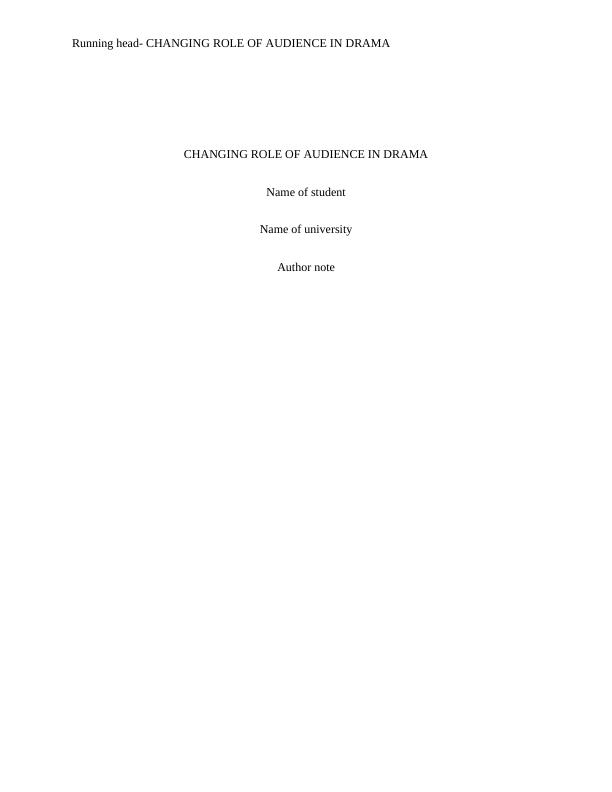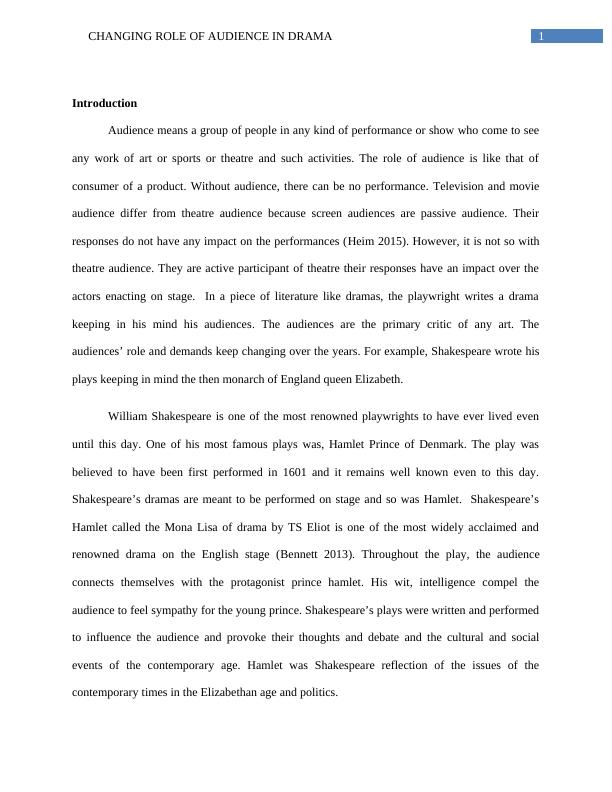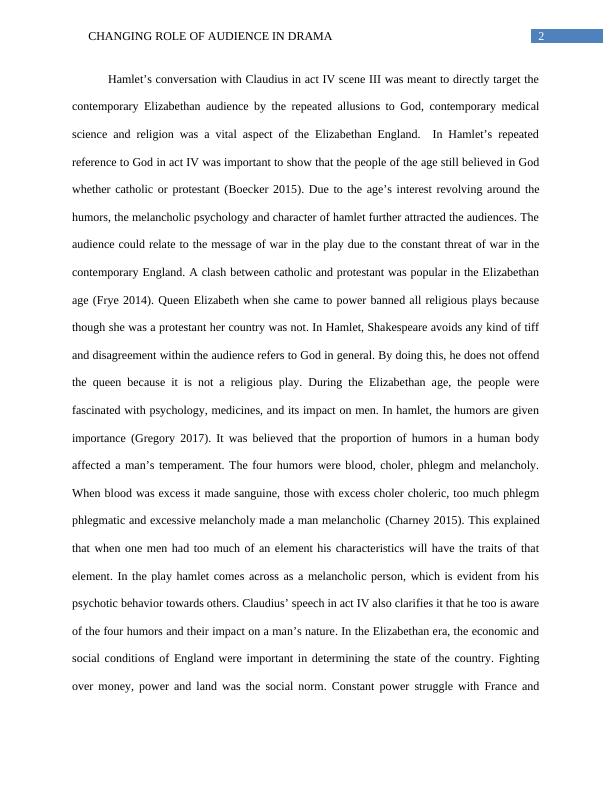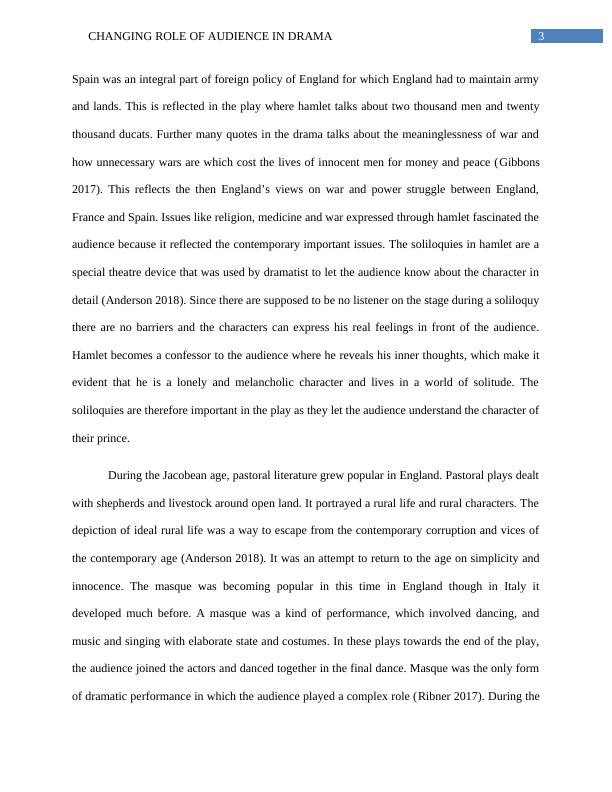Changing Role of Audience in Drama
12 Pages3760 Words64 Views
Added on 2023-06-15
About This Document
This essay explores the changing role of audience in drama through the works of Shakespeare, Bond, Brecht, and Beckett. It discusses how the audience's demands and expectations have evolved over time and how playwrights have adapted to these changes. The essay covers topics such as the impact of religion, medicine, and war on Elizabethan drama, the alienation effect of Brecht, and the shattering of the fourth wall in modern drama.
Changing Role of Audience in Drama
Added on 2023-06-15
ShareRelated Documents
Running head- CHANGING ROLE OF AUDIENCE IN DRAMA
CHANGING ROLE OF AUDIENCE IN DRAMA
Name of student
Name of university
Author note
CHANGING ROLE OF AUDIENCE IN DRAMA
Name of student
Name of university
Author note

1CHANGING ROLE OF AUDIENCE IN DRAMA
Introduction
Audience means a group of people in any kind of performance or show who come to see
any work of art or sports or theatre and such activities. The role of audience is like that of
consumer of a product. Without audience, there can be no performance. Television and movie
audience differ from theatre audience because screen audiences are passive audience. Their
responses do not have any impact on the performances (Heim 2015). However, it is not so with
theatre audience. They are active participant of theatre their responses have an impact over the
actors enacting on stage. In a piece of literature like dramas, the playwright writes a drama
keeping in his mind his audiences. The audiences are the primary critic of any art. The
audiences’ role and demands keep changing over the years. For example, Shakespeare wrote his
plays keeping in mind the then monarch of England queen Elizabeth.
William Shakespeare is one of the most renowned playwrights to have ever lived even
until this day. One of his most famous plays was, Hamlet Prince of Denmark. The play was
believed to have been first performed in 1601 and it remains well known even to this day.
Shakespeare’s dramas are meant to be performed on stage and so was Hamlet. Shakespeare’s
Hamlet called the Mona Lisa of drama by TS Eliot is one of the most widely acclaimed and
renowned drama on the English stage (Bennett 2013). Throughout the play, the audience
connects themselves with the protagonist prince hamlet. His wit, intelligence compel the
audience to feel sympathy for the young prince. Shakespeare’s plays were written and performed
to influence the audience and provoke their thoughts and debate and the cultural and social
events of the contemporary age. Hamlet was Shakespeare reflection of the issues of the
contemporary times in the Elizabethan age and politics.
Introduction
Audience means a group of people in any kind of performance or show who come to see
any work of art or sports or theatre and such activities. The role of audience is like that of
consumer of a product. Without audience, there can be no performance. Television and movie
audience differ from theatre audience because screen audiences are passive audience. Their
responses do not have any impact on the performances (Heim 2015). However, it is not so with
theatre audience. They are active participant of theatre their responses have an impact over the
actors enacting on stage. In a piece of literature like dramas, the playwright writes a drama
keeping in his mind his audiences. The audiences are the primary critic of any art. The
audiences’ role and demands keep changing over the years. For example, Shakespeare wrote his
plays keeping in mind the then monarch of England queen Elizabeth.
William Shakespeare is one of the most renowned playwrights to have ever lived even
until this day. One of his most famous plays was, Hamlet Prince of Denmark. The play was
believed to have been first performed in 1601 and it remains well known even to this day.
Shakespeare’s dramas are meant to be performed on stage and so was Hamlet. Shakespeare’s
Hamlet called the Mona Lisa of drama by TS Eliot is one of the most widely acclaimed and
renowned drama on the English stage (Bennett 2013). Throughout the play, the audience
connects themselves with the protagonist prince hamlet. His wit, intelligence compel the
audience to feel sympathy for the young prince. Shakespeare’s plays were written and performed
to influence the audience and provoke their thoughts and debate and the cultural and social
events of the contemporary age. Hamlet was Shakespeare reflection of the issues of the
contemporary times in the Elizabethan age and politics.

2CHANGING ROLE OF AUDIENCE IN DRAMA
Hamlet’s conversation with Claudius in act IV scene III was meant to directly target the
contemporary Elizabethan audience by the repeated allusions to God, contemporary medical
science and religion was a vital aspect of the Elizabethan England. In Hamlet’s repeated
reference to God in act IV was important to show that the people of the age still believed in God
whether catholic or protestant (Boecker 2015). Due to the age’s interest revolving around the
humors, the melancholic psychology and character of hamlet further attracted the audiences. The
audience could relate to the message of war in the play due to the constant threat of war in the
contemporary England. A clash between catholic and protestant was popular in the Elizabethan
age (Frye 2014). Queen Elizabeth when she came to power banned all religious plays because
though she was a protestant her country was not. In Hamlet, Shakespeare avoids any kind of tiff
and disagreement within the audience refers to God in general. By doing this, he does not offend
the queen because it is not a religious play. During the Elizabethan age, the people were
fascinated with psychology, medicines, and its impact on men. In hamlet, the humors are given
importance (Gregory 2017). It was believed that the proportion of humors in a human body
affected a man’s temperament. The four humors were blood, choler, phlegm and melancholy.
When blood was excess it made sanguine, those with excess choler choleric, too much phlegm
phlegmatic and excessive melancholy made a man melancholic (Charney 2015). This explained
that when one men had too much of an element his characteristics will have the traits of that
element. In the play hamlet comes across as a melancholic person, which is evident from his
psychotic behavior towards others. Claudius’ speech in act IV also clarifies it that he too is aware
of the four humors and their impact on a man’s nature. In the Elizabethan era, the economic and
social conditions of England were important in determining the state of the country. Fighting
over money, power and land was the social norm. Constant power struggle with France and
Hamlet’s conversation with Claudius in act IV scene III was meant to directly target the
contemporary Elizabethan audience by the repeated allusions to God, contemporary medical
science and religion was a vital aspect of the Elizabethan England. In Hamlet’s repeated
reference to God in act IV was important to show that the people of the age still believed in God
whether catholic or protestant (Boecker 2015). Due to the age’s interest revolving around the
humors, the melancholic psychology and character of hamlet further attracted the audiences. The
audience could relate to the message of war in the play due to the constant threat of war in the
contemporary England. A clash between catholic and protestant was popular in the Elizabethan
age (Frye 2014). Queen Elizabeth when she came to power banned all religious plays because
though she was a protestant her country was not. In Hamlet, Shakespeare avoids any kind of tiff
and disagreement within the audience refers to God in general. By doing this, he does not offend
the queen because it is not a religious play. During the Elizabethan age, the people were
fascinated with psychology, medicines, and its impact on men. In hamlet, the humors are given
importance (Gregory 2017). It was believed that the proportion of humors in a human body
affected a man’s temperament. The four humors were blood, choler, phlegm and melancholy.
When blood was excess it made sanguine, those with excess choler choleric, too much phlegm
phlegmatic and excessive melancholy made a man melancholic (Charney 2015). This explained
that when one men had too much of an element his characteristics will have the traits of that
element. In the play hamlet comes across as a melancholic person, which is evident from his
psychotic behavior towards others. Claudius’ speech in act IV also clarifies it that he too is aware
of the four humors and their impact on a man’s nature. In the Elizabethan era, the economic and
social conditions of England were important in determining the state of the country. Fighting
over money, power and land was the social norm. Constant power struggle with France and

3CHANGING ROLE OF AUDIENCE IN DRAMA
Spain was an integral part of foreign policy of England for which England had to maintain army
and lands. This is reflected in the play where hamlet talks about two thousand men and twenty
thousand ducats. Further many quotes in the drama talks about the meaninglessness of war and
how unnecessary wars are which cost the lives of innocent men for money and peace (Gibbons
2017). This reflects the then England’s views on war and power struggle between England,
France and Spain. Issues like religion, medicine and war expressed through hamlet fascinated the
audience because it reflected the contemporary important issues. The soliloquies in hamlet are a
special theatre device that was used by dramatist to let the audience know about the character in
detail (Anderson 2018). Since there are supposed to be no listener on the stage during a soliloquy
there are no barriers and the characters can express his real feelings in front of the audience.
Hamlet becomes a confessor to the audience where he reveals his inner thoughts, which make it
evident that he is a lonely and melancholic character and lives in a world of solitude. The
soliloquies are therefore important in the play as they let the audience understand the character of
their prince.
During the Jacobean age, pastoral literature grew popular in England. Pastoral plays dealt
with shepherds and livestock around open land. It portrayed a rural life and rural characters. The
depiction of ideal rural life was a way to escape from the contemporary corruption and vices of
the contemporary age (Anderson 2018). It was an attempt to return to the age on simplicity and
innocence. The masque was becoming popular in this time in England though in Italy it
developed much before. A masque was a kind of performance, which involved dancing, and
music and singing with elaborate state and costumes. In these plays towards the end of the play,
the audience joined the actors and danced together in the final dance. Masque was the only form
of dramatic performance in which the audience played a complex role (Ribner 2017). During the
Spain was an integral part of foreign policy of England for which England had to maintain army
and lands. This is reflected in the play where hamlet talks about two thousand men and twenty
thousand ducats. Further many quotes in the drama talks about the meaninglessness of war and
how unnecessary wars are which cost the lives of innocent men for money and peace (Gibbons
2017). This reflects the then England’s views on war and power struggle between England,
France and Spain. Issues like religion, medicine and war expressed through hamlet fascinated the
audience because it reflected the contemporary important issues. The soliloquies in hamlet are a
special theatre device that was used by dramatist to let the audience know about the character in
detail (Anderson 2018). Since there are supposed to be no listener on the stage during a soliloquy
there are no barriers and the characters can express his real feelings in front of the audience.
Hamlet becomes a confessor to the audience where he reveals his inner thoughts, which make it
evident that he is a lonely and melancholic character and lives in a world of solitude. The
soliloquies are therefore important in the play as they let the audience understand the character of
their prince.
During the Jacobean age, pastoral literature grew popular in England. Pastoral plays dealt
with shepherds and livestock around open land. It portrayed a rural life and rural characters. The
depiction of ideal rural life was a way to escape from the contemporary corruption and vices of
the contemporary age (Anderson 2018). It was an attempt to return to the age on simplicity and
innocence. The masque was becoming popular in this time in England though in Italy it
developed much before. A masque was a kind of performance, which involved dancing, and
music and singing with elaborate state and costumes. In these plays towards the end of the play,
the audience joined the actors and danced together in the final dance. Masque was the only form
of dramatic performance in which the audience played a complex role (Ribner 2017). During the

End of preview
Want to access all the pages? Upload your documents or become a member.
Related Documents
Essay on Tragedy of Faustus and Macbeth for Renaissancelg...
|11
|3791
|75
